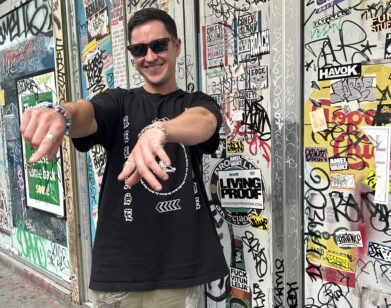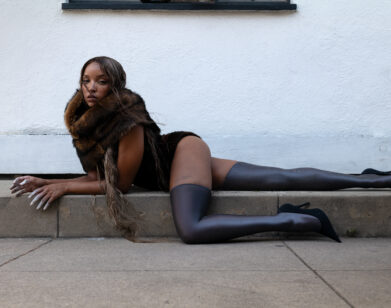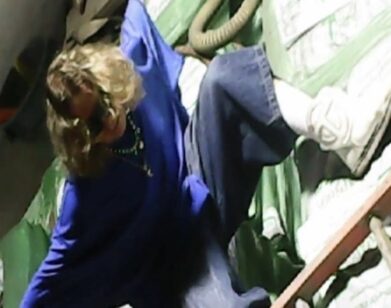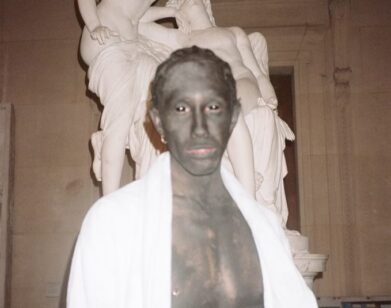(JJ)ESUS and SSION Talk Love in the Age of Trolls

As a former stylist for magazines like i-D and V, the DJ Julian Jesus—who goes by (JJ)ESUS—has always been hyper-aware of what makes a compelling visual narrative. That sensibility didn’t fade when he began working as a DJ and musician: His latest album, 6 Days of Troll is identified as a “soundtrack to a short non-film.” The first of these non-films is “Troll or Ghost,” a haunting (and, maybe, haunted) visual exploration of the energies and entities that make up modern romance, set to the techno-reverbs of (JJ)ESUS’s eerie track.
In spirit of all things supernatural, (JJ)ESUS holed up with his friend and fellow all-around creative Cody Critcheloe, or SSION—the mind and directorial eye behind videos for Charlie XCX, Robyn, and King Princess, among others—in his Williamsburg “witch hut.” Having appropriately set the scene, the DJs and directors explored the mythical process of music video-making, the power of Sharon Stone, and love in the age of trolls. —JADIE STILLWELL
———
SSION: I’m starting the interview with JJ right now. We’re walking to my apartment that I’m getting ready to move out of because I’m moving to LA tomorrow and they’re tearing it down to build a high-rise. I have this apartment in Williamsburg that basically looks like a witch hut, so it makes sense. It also makes sense that we’re doing this interview in the apartment that looks like a witch hut because JJ is a witch. JJ, explain the front of this apartment.
JJ: Witch hut is fitting. This is what I thought New York would be when I was moving here. I thought my apartment would definitely look like this.
SSION: Thank god it doesn’t. We’re getting ready to watch JJ’s new video, with Miles [Greenberg]. I love that you’re actually in the video. That was like the most shocking thing to me, that you put yourself in it. I feel like a lot of times with music in this style, you never see the actual person making it.
JJ: I wasn’t supposed to be in it. Originally, it was going to be Miles and a few other characters, and it ended up being this. It felt natural for the narrative. It just flowed as we went along. We would find a spot in this building, which was really, really old and dusty, and rearrange some furniture, and Miles would magically create the scene and just start to dance himself into it. We all had the feeling that we were a bit led on and possessed, the way that it all worked out. The building was definitely haunted.
SSION: The bed has sheets. Did you guys bring that in or were they already there?
JJ: It was just there and we have no idea when it’s from. It could it be from, like, the ’70s or from last month. The building was called The King’s something. It was like the first brothel for the king’s concubines in Montreal.
SSION: The first thing that I think of when I see this is, “Oh, is Miles your trick?”
JJ: Even without the contact? We don’t really have contact until the end when I realize he’s there.
SSION: There’s something throne-like about you on the bed, and the white robe and stuff. It feels like he’s a trick. It’s not a bad thing.
JJ: I can see that. He was meant to be the unannounced troll or ghost, the spirit that I was unaware of. He was a sensual presence.
SSION: So kind of a trick, but a ghosty trick.
JJ: A mind trick!
SSION: Explain the paper that’s blowing around.
JJ: It’s supposed to be the disintegration of these concrete ideas that are set down in a stone tablet or book, being ripped out and rearranged by the wind.
SSION: How does that tie back into the concept of the troll/ghost thing?
JJ: The troll/ghost thing is a play on those words as they relate to the way we communicate in modern times, like trolling or ghosting by text or on social media, and how these supernatural ideas tie into how we’re speaking to each other physically, romantically, sexually. That’s why Miles is representative of a presence that you feel but don’t know how to play with. A lot of times, as we’re getting used to this new form of communication that we’ve all so quickly adopted, we don’t really know how to approach it or interact with it. I have this question: You meet this guy and he’s your thing, you’re falling in love with him, and suddenly you hit this cliff where he’s going to troll you or ghost you. If he’s either going to make you feel really bad or just completely disappear off the face of the earth, which entity would you choose?
SSION: I think ghosting is more intense because it’s a lack of attention. At least with trolling, someone’s still giving you that attention, so you know that they care on some level. I always think in order to be super successful, the hate has to almost outweigh the love. If you look at a really popular music video on YouTube, it’s usually a Taylor Swift, a Nicki Minaj, where the dislikes outweigh the likes on it. It’s the same thing with someone like Trump, where the hate gives him more power, especially now. I feel like in those kinds of relationships, I have a tendency to ghost because if I’m trolling someone, it just sucks all the energy out of me, because I’m putting that energy into someone else.
JJ: But wouldn’t ghosting take more effort because you have to constantly be aware?
SSION: I don’t think so because the thing with ghosting is, with a phone, you just block them. The minute that you’ve fully blocked and muted someone, they really do just disappear.
JJ: But it creates more of a presence for that person, no?
SSION: Maybe for that person, but if I’m the ghost, it frees me in a way. If I really need to get away from someone, especially in a romantic sense, I feel like ghosting frees me the most. It gives you more power. Trolling is more powerless.
JJ: I think trolling gives you more power, because it’s so impulsive and interactive. This is very dependent on personality type, but for me ghosting requires more energy. It’s literally like an endless void for my projections and a box for my insecurities.
One of my friends showed me a trick where you could look at someone’s stories by looking at the story post before them and then slowly moving your thumb to the right and just see a little glimpse of what that person you’re interested in posted and they won’t get a notification.
SSION: Or you could just create another account.
JJ: Ghosting has only recently become an option. Ghosting has become a form of psychological manipulation, torture, interaction, whatever you want to call it, with our modern technology. If you were to ghost somebody in the past, it would just be like, “Shit, I haven’t seen that person in a while. We must not be going to the same restaurants, the same bars.” It wouldn’t be seen as this active, intentional kind of removal from your life in this really active, intentional way. Modern ghosting is so filled with intention.
SSION: I was in JJ’s home studio last night because I’m crashing at his place while I get all the shit out of my witch hut in Williamsburg. We watched the classic erotic thriller Sliver, which was actually incredible. That’s a movie about trolling. It’s trolling before the internet existed, when it was all surveillance.
JJ: It was such a one-sided troll. With William Baldwin.
SSION: Everyone should watch Sliver because he is just beautiful in it. He’s extremely hairy, but they oddly made him shave his happy trail. You don’t have a chest that hairy and then have a belly button with no hair on it, which was kind of a bummer.
JJ: Or no hair on your legs or ass.
SSION: His ass has a great shot in this movie, an iconic shot, but it’s hairless, which I think is a real shame. We can’t steal the show away from Sharon Stone.
JJ: The movie ends with Sharon Stone pointing a remote control at the camera, at the audience, and saying, “Get a life.”
SSION: I mean, it’s cheesy. It’s very camp, like all those erotic thrillers are. But I actually thought it was kind of an amazing way to end it. It gives her all the power. It’s like a feminist statement: “Get a life, dude.”
JJ: I really liked what you were saying about when she was playing golf with the coffee mug.
SSION: There’s this scene right when she first moves into her new, fab New York apartment and she has a quiet night at home. She’s playing putt-putt golf with a coffee mug, and she basically has an orgasm when she finally gets a ball into the mug.
JJ: Cody just says, “If this was today she would be on Instagram.”
SSION: That’s my biggest issue with most movies now. I always think, “Well, if it was realistic, everyone would just be on their phone and it would be such a boring movie.”
JJ: Or at least checking their phone, or taking a group photo, or something that interrupts the poetry of the moment.
SSION: I think that in itself can be pretty gross and poetic. When I first met you, you were doing styling and stuff. Then you got into music. Tell me about breaking into that, what inspired it, and how you got to this point where you’re putting visuals together and stuff.
JJ: It was nice to put up this video because for me, music starts with visuals, then gets translated musically. To have it come full circle back into a visual felt really strong in terms of expressing an original idea. I’ll usually sort of mood board visually, piece things together that fit into that universe, and then from afar admire different bits of different songs. I’ll take a key change or a certain transition, or the way something begins or grows or finishes, and allow that to translate into a visual idea I have in my mind. In this case, it was a life experience.
SSION: What was the life experience?
JJ: It was a sort of surprise love affair that revolutionized my life. It happened in Iceland, actually. It’s funny because around that time I came across a book from this Icelandic scholar. The gist of it was how in medieval times, the countries of the North considered every supernatural activity, including childbirth, to be something like a troll. The aurora could have been a visitation of a troll. Anything unexplained was troll. They became obsessed with this word.
SSION: Now it means something totally different, right?
JJ: A mythology grew from it. There was a sort of organized taxonomy of troll. A specific troll became a ghost or a vampire. It was a way for humans to try to categorize and control these things that they were and are unable to understand. I had this idea that the romantic, the sexual, the intimate, especially the birth of a romance or sexual affair, is a troll. It’s a very supernatural idea and is just as unexplained as an aurora, or a ghost, or a vampire visitation. The video ended up reflecting this with the visitation of an unknown entity that’s neither acknowledged or ignored. I find it interesting that romance was never placed in the category of the supernatural. It’s, I think, just about as understood as a haunted house. The first week of a love affair is literally like visiting a haunted house.
SSION: Or the last week.
JJ: Or the last week, or wherever you could pinpoint a climax in a relationship or a plateau.
SSION: The plateau is the worst part.
JJ: Why?
SSION: I love things that are getting started, and there’s something really romantic about the pain of something finishing or being over. But there’s something grueling and miserable about a plateau in any sense. That’s part of the reason why I have an issue with being in one place all the time, why I like to constantly be on the move, or constantly meet new people, or do new things.
JJ: What’s the first indication that you’ve reached a plateau?
SSION: Boredom. Or feeling like I’m not challenging myself or doing something. I have a really intensely, guttural reaction towards those kinds of things.
JJ: Topographically speaking, could you dig into the metaphor of what a plateau is?
SSION: It’s childhood for me. If you’re talking about the actual landscape of it, then that’s Kentucky.
JJ: It’s flat in Kentucky.
SSION: And you have no one around you. It’s beautiful, but I couldn’t wait to leave.
JJ: Are the mountains and the hills of LA calling to you as a remedy to that right now?
SSION: No. I am just really attracted to people and movement and life and energy. I can appreciate a stillness and a calmness but, I don’t know, I think I was always so excited to leave. Remember, we were just listening to that Pet Shop Boys song, “This Must Be the Place I’ve Waited Years to Leave.” What was the name of that album again?
JJ: Behaviour. It’s spelled Britishly. Actually, one of the lyrics of that Pet Shop Boys album became a song title on 6 Days of Troll. “Only the Wind” from Behaviour, the Pet Shop Boys album, Only the Wind, there was a line in that song that says, “A storm blows itself out,” and that’s a track on 6 Days of Troll. It was really satisfying when the video forced itself out. It was the whole “storm blows itself out” concept. The circle just completed itself.
There was literally a spare kimono lying around in the styling rack. It was like we were all pushed into some possession or to some pre-choreographed dance, especially with the way Miles moved, with the way I just put this on and started playing this role that felt so fitting and expressively correct in every scene. It was kind of like I didn’t have the choice anymore, and I knew that if this video was going to manifest, the only proper way it could was with me in it.
SSION: I love that you were like, “There was just this extra kimono lying around,” like this kimono was saying, “JJ…”
JJ: With Miles, there’s always an extra kimono lying around. It was strangely not surprising. I don’t even remember putting it on for the first time.
SSION: I’m sure you remember taking it off.
JJ: I do. I was completely naked underneath.
SSION: Were you nervous about being on camera? I mean, you’ve had experience dressing people for things and you’ve probably seen all different types of sort of neuroses with being on camera.
JJ: I thought it was really interesting, because I was really unprepared. There was really no hair, makeup situation. I really did feel like there was no choice in the matter. It was just happening. Even just the way we got the space, it was just like, “Oh, I would really, really love something that felt like a whorehouse.” All of a sudden, Miles is like, “Hey, this whorehouse just became available through a number of interesting means in Montreal, and it’s all ours for as long as we want it.” It did feel like the supernatural was ushering us into the production of what was happening.
SSION: It’s also sounds like it was a super casual set.
JJ: And a small team. Sometimes a big team makes you feel more comfortable because there’s a sense of anonymity. Do you still feel timid when you go on camera?
SSION: No, I don’t. If I’m directing it, then I don’t feel timid about things. It’s when I lose that control and someone else is directing something, that’s when I get a little bit more nervous, especially if it’s something for me. If someone cast me as a character actor in a movie where I was not playing myself, I don’t think I would be as nervous. I feel like if it’s me doing SSION, which is me pretending to be a pop star, then I kind of want to control that situation. Obviously I’m not trying to look hot in this typical way, but there is a way that I do want to look.
JJ: A projection of an image?
SSION: Yeah. I feel like as long as I can have control over it, I don’t get timid or upset about things. When I feel like I’m giving that control over to someone else, I sometimes get nervous. I guess at this point, I’ve kind of made peace with it. I’m just like, “Well, this is how I look, hopefully they’ll just pick the best photo to use because I can’t do anything about it.”
JJ: You let it flow.
SSION: Or I try to.
JJ: It’s a very interesting point that you’re not really going to change the way you look or are presented, even if you think you’re taking control of your image. It’s going to be perceived as it’s going to be perceived. You do not have control over that.
SSION: There’s this very kind of gross side of being a director where you think about stuff that isn’t conceptual or narrative, and you start thinking about the way something is lit, the location. Now the problem with me is when I watch videos, my first thing is like, “I wonder how much they had to do this.”
JJ: You kept saying that when we were watching Sliver. You were like, “The lighting shifts from him to her. There’s different lighting team on William Baldwin and Sharon Stone.”
SSION: I see things now and think, “Oh, I bet they were running out of time.” It’s weird how doing it so much shifts your ability to just sort of ride in the moment.
JJ: I think you tend to be a perfectionist in your work.
SSION: Sure. I also think that when I’m doing something, there’s a very set in stone plan.
JJ: Set in Sharon Stone plan.
SSION: There’s a shit in Staron Stone plan. Staron is a good name. Staron, come here.
JJ: Staron Stone-Baldwin.
SSION: Staron Stoned.






